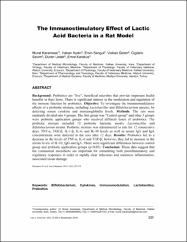| dc.contributor.author | Karameşe, Murat | |
| dc.contributor.author | Aydın, Hakan | |
| dc.contributor.author | Şengül, Emin | |
| dc.contributor.author | Gelen, Volkan | |
| dc.contributor.author | Sevim, Çiğdem | |
| dc.contributor.author | Üstek, Duran | |
| dc.contributor.author | Karakuş, Emre | |
| dc.date.accessioned | 10.07.201910:49:13 | |
| dc.date.accessioned | 2019-07-10T19:57:04Z | |
| dc.date.available | 10.07.201910:49:13 | |
| dc.date.available | 2019-07-10T19:57:04Z | |
| dc.date.issued | 2016 | en_US |
| dc.identifier.citation | Karameşe, M., Aydın, H., Şengül, E., Gelen, V., Sevim, Ç., Üstek, D. ... Karakuş, E. (2016). The immunostimulatory effect of lactic acid bacteria in a rat model. Iranian Journal of Immunology, 13(3), 220-228. | en_US |
| dc.identifier.issn | 1735-1383 | |
| dc.identifier.issn | 1735-367X | |
| dc.identifier.uri | https://hdl.handle.net/20.500.12511/2890 | |
| dc.description | WOS: 000390674400007 | en_US |
| dc.description | PubMed ID: 27671513 | en_US |
| dc.description.abstract | Background: Probiotics are "live", beneficial microbes that provide important health benefits in their hosts. There is significant interest in the modulation and regulation of the immune function by probiotics. Objective: To investigate the immunomodulatory effects of a probiotic mixture, including Lactobacillus and Bifidobacterium species, by detecting serum cytokine and immunoglobulin levels. Methods: The rats were randomly divided into 4 groups. The first group was "Control group" and other 3 groups were probiotic application groups who received different doses of probiotics. The probiotic mixture included 12 probiotic bacteria, mostly Lactobacillus and Bifidobacterium strains. Probiotic mixture was administered to rats for 12 consecutive days. TNF-alpha, TGF-beta, IL-1-beta, IL-6, and IL-10 levels as well as serum IgG and IgA concentrations were detected in the sera after 12 days. Results: Probiotics led to a decrease in the levels of TNF-alpha, IL-6 and TGF-beta; however, they led to increase in the serum levels of IL-10, IgG and IgA. There were significant differences between control group and probiotic application groups (p<0.05). Conclusion: These data suggest that the commensal microbiota are important for stimulating both proinflammatory and regulatory responses in order to rapidly clear infections and minimize inflammation-associated tissue damage. | en_US |
| dc.description.sponsorship | Kafkas University, Scientific Research Project Council [2016-TS-43] | en_US |
| dc.description.sponsorship | Thanks for Dr. Ismail CAN for invaluable support to some steps of the experiments and methods. The current study was supported by Kafkas University, Scientific Research Project Council under the project number: 2016-TS-43. | en_US |
| dc.language.iso | eng | en_US |
| dc.publisher | Shiraz Inst Cancer Res | en_US |
| dc.rights | info:eu-repo/semantics/openAccess | en_US |
| dc.subject | Bifidobacterium | en_US |
| dc.subject | Cytokines | en_US |
| dc.subject | Immunomodulation | en_US |
| dc.subject | Lactobacillus | en_US |
| dc.subject | Probiotics | en_US |
| dc.title | The immunostimulatory effect of lactic acid bacteria in a rat model | en_US |
| dc.type | article | en_US |
| dc.relation.ispartof | Iranian Journal of Immunology | en_US |
| dc.department | İstanbul Medipol Üniversitesi, Tıp Fakültesi, Dahili Tıp Bilimleri Bölümü, Tıbbi Genetik Ana Bilim Dalı | en_US |
| dc.authorid | 0000-0002-0060-2859 | en_US |
| dc.identifier.volume | 13 | en_US |
| dc.identifier.issue | 3 | en_US |
| dc.identifier.startpage | 220 | en_US |
| dc.identifier.endpage | 228 | en_US |
| dc.relation.publicationcategory | Makale - Uluslararası Hakemli Dergi - Kurum Öğretim Elemanı | en_US |
| dc.identifier.wosquality | Q4 | en_US |
| dc.identifier.scopusquality | Q3 | en_US |


















